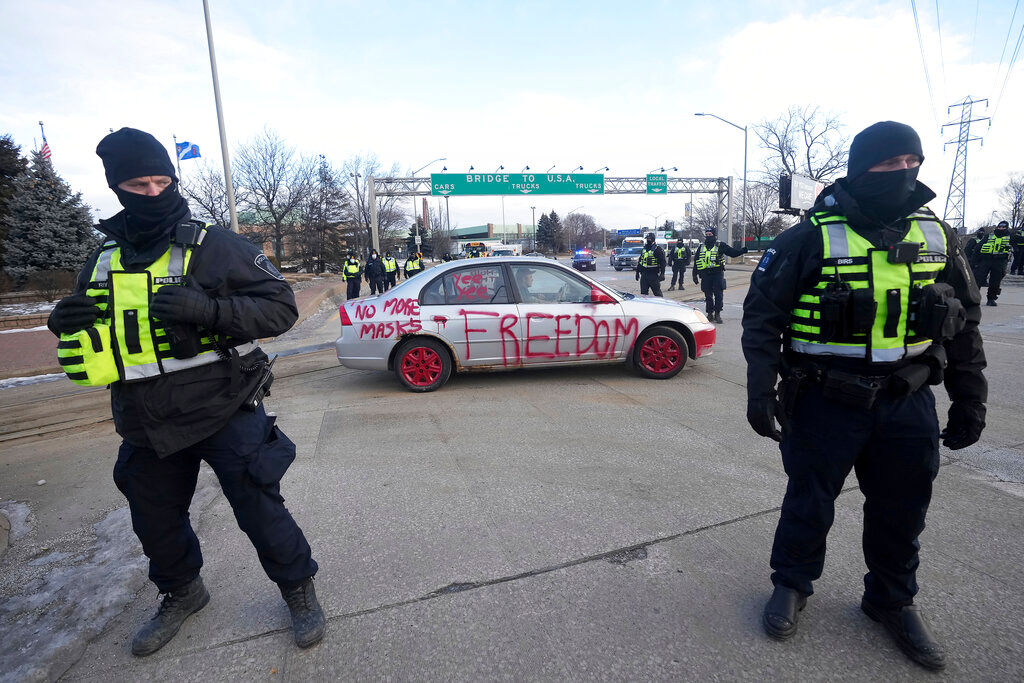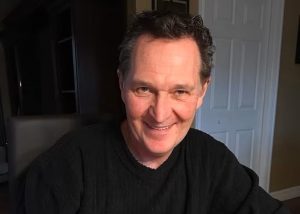A tense standoff at a U.S.-Canadian border crossing crucial to both countries’ economies appeared to be dissolving peacefully Saturday as Canadian police moved in to disperse the nearly weeklong blockade and demonstrators began leaving without resistance.
Many demonstrators drove away from the Ambassador Bridge spanning the river between Detroit and Windsor, Ontario, as scores of police approached shortly after dawn. They had spent the night there in defiance of new warnings to end the blockade, which disrupted the flow of traffic and goods and forced the auto industry on both sides to roll back production.
Surrounded by dozens of officers, a man with “Mandate Freedom” and “Trump 2024” spray-painted on his vehicle left as other protesters began dismantling a small tarp-covered encampment. A trucker honked his horn as he, too, drove off, to cheers and chants of “Freedom!”
Also read | Canada orders ‘Freedom Convoy’ protesters to end US border bridge blockade
The demonstrations at the Ambassador Bridge, downtown Ottawa and elsewhere have targeted vaccine mandates and other coronavirus restrictions and vented fury toward Prime Minister Justin Trudeau, who has called the protesters a “fringe” of Canadian society.
The protests have reverberated outside the country, with similarly inspired convoys in France, New Zealand and the Netherlands, and the U.S. Department of Homeland Security warned that truck protests may be in the works in the United States.
Windsor police tweeted that no one had been arrested as of mid-morning but urged people to stay away from the bridge: “We appreciate the cooperation of the demonstrators at this time and we will continue to focus on resolving the demonstration peacefully. Avoid area!”
Also read | Canada’s Ontario province declares emergency over truckers’ protests
Daniel Koss was among those who stayed overnight. Shortly before police advanced, he said the protest had succeeded in bringing attention to demands to lift COVID-19 mandates and he was happy it remained peaceful.
“It’s a win-win,” Koss said. “The pandemic is rolling down right now, they can remove the mandates, all the mandates, and everyone’s happy. The government does the right thing, and the protesters are all happy.”
He said he believed most people would disperse in an orderly fashion, “because we don’t want to cause a big problem.”
More protesters arrived to the area late Saturday morning, though, carrying flags and yelling. Police continued to back people away from the bridge, and there were no visible physical confrontations.
Also read | As Freedom Convoy chokes carmakers, US urges Canada to use federal powers
The previous day, a judged ordered the an end to the blockade of mostly pickup trucks and cars, and Ontario Premier Doug Ford declared a state of emergency allowing for fines of 100,000 Canadian dollars and up to one year in jail for anyone illegally blocking roads, bridges, walkways and other critical infrastructure.
“The illegal blockades are impacting trade, supply chains & manufacturing. They’re hurting Canadian families, workers & businesses. Glad to see the Windsor Police & its policing partners commenced enforcement at and near the Ambassador Bridge,” Federal Innovation Minister Francois-Philippe Champagne tweeted Saturday. “These blockades must stop.”
The Ambassador Bridge is the busiest U.S.-Canadian border crossing, carrying 25% of all trade between the two countries. The standoff came at a time when the auto industry is already struggling to maintain production in the face of pandemic-induced shortages of computer chips and other supply-chain disruptions.
Also read | Convoy protests over anti-vaccine continue in Canada’s Ottawa: What we know so far
In the capital, Ottawa, Mayor Jim Watson declared a state of emergency last week after thousands of protesters descended on the city. Their numbers have dwindled but hundreds of trucks remain parked in front of the Parliament Buildings, and demonstrators have set up portable toilets where Trudeau’s motorcade usually parks outside the prime minister’s office.
Police issued a statement Saturday calling the Ottawa protest an unlawful occupation and saying they were waiting for “reinforcements” before implementing a plan to end the demonstration. The statement did not elaborate.
While the protesters are decrying vaccine mandates for truckers and other COVID-19 restrictions, many of Canada’s infection measures, such as mask rules and vaccine passports for getting into restaurants and theaters are already falling away as the omicron surge levels off.
Also read | In Pics | ‘Freedom Convoy’ protests continue as US urges Canada to act
Pandemic restrictions have been far stricter in Canada than in the U.S., but Canadians have largely supported them. The vast majority of Canadians are vaccinated, and the COVID-19 death rate is one-third that of the United States.
Protests inspired by the Canadian demonstrations were seen in parts of Europe on Saturday.
At least 500 vehicles in several convoys attempted to enter Paris at key arteries but were intercepted by police. Over 200 motorists were ticketed, and elsewhere at least two protesters were detained amid a seizure of knives, hammers and other objects in a central square.
Also read | Truck blockade at US-Canadian border shuts auto plants
Police fired tear gas against a handful of people who demonstrated on the Champs Elysees Avenue in defiance of a police order. Some 7,000 officers have been mobilized for the weekend protesters, who are railing against the vaccination pass that France requires to enter restaurants and many other venues.
In the Netherlands, meanwhile, dozens and trucks and other vehicles ranging from tractors to a car towing a camping van arrived in The Hague, blocking an entrance to the historic parliamentary complex. Protesters on foot joined them, carrying a banner emblazoned with “Love & freedom, no dictatorship” in Dutch.
Earlier this week in New Zealand, protesters rolled up to Parliament grounds in a convoy of cars and trucks and set up camp. Police have taken a hands-off approach after initial attempts to remove them resulted in physical confrontations.
Parliament Speaker Trevor Mallard on Friday ordered his staff to turn on the lawn’s sprinklers to douse them and to play Barry Manilow tunes and the 1990s hit “Macarena” over loudspeakers to annoy them. Protesters responded by playing their own songs, including Twisted Sister’s “We’re Not Gonna Take It.”







